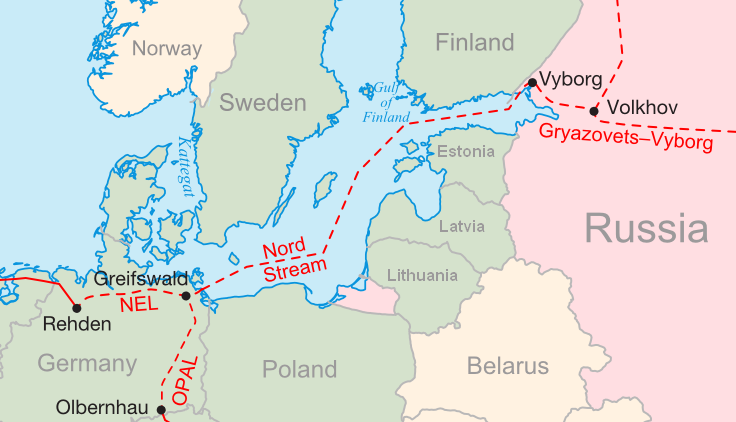
Russian energy giant Gazprom cut off the flow of natural gas to Germany and other European markets via the Nord Stream pipeline on Aug. 31, calling it a three-day shut-down for maintenance purposes. But Western governments charge that Russia is “weaponizing” gas supplies amid the Ukraine war. (EuroNews) Days earlier, Germany’s government broached allowing the blocked Nord Stream 2 pipeline to begin pumping Russian gas. Wolfgang Kubicki, vice president of the Bundestag, said the move is necessary so “people do not have to freeze in winter and that our industry does not suffer serious damage.” His comment prompted a harsh response from Kyiv, where Foreign Minister Dmytro Kuleba said that “addiction to Russian gas kills.” (Politico)
Map: Wikipedia





Nord Stream shutdown now ‘indefinite’
Russian energy giant Gazprom now say gas supplies to Central and Western Europe via the Nord Stream 1 pipeline have completely stopped due to equipment issues. It gave no time frame on when it would restart the pipeline. (DW)
Some 70,000 people protested in Prague against Sept. 3, calling on the Czech Republic’s ruling coalition to control soaring energy prices, and voicing opposition to the European Union and NATO. (Reuters)
Nord Stream pipeline sabotage?
Two undersea leaks that began in the Russian-owned Nord Stream 1 and 2 gas pipelines on Sept. 26 were likely caused by powerful underwater explosions, according to seismographic data. Neither of the pipelines are active, as Russia has cut gas deliveries in them, but both were filled with natural gas when the drop in pressure occurred. (NPR) Top Polish and Ukrainian leaders blamed Moscow, while Russian state media suggested U.S. or Ukrainian involvement. (NYT, The Hill)
Back in February, President Joe Biden warned: “If Russia invades… then there will be longer Nord Stream 2. We will bring an end to it.” When asked how he would do that, he responded, “I promise you we will be able to do it.” (EuroNews)
North Sea gas reaches Poland through new pipeline
Gas started flowing to Poland through the new Baltic Pipe pipeline from Norway via Denmark on Oct. 1, Polish gas operator Gaz-System announced. (Reuters)
Russia bans oil exports in response to G7 price cap
Russian President Vladimir Putin on Dec. 28 signed an executive order banning the sale of Russian oil for five months to countries that implemented a fuel and energy price cap in response to the war in Ukraine. A Kremlin website said the executive order responded “to the unfriendly actions taken by the United States, other foreign states and international organizations that sided with them, to establish a price cap on Russian oil and oil products, which is in violation of international law.”
The G7 nations and Australia said on Dec. 5 they had agreed a $60 per barrel price cap on Russian seaborne crude oil. G7 shipping, insurance and insurance companies will also be prohibited from handling Russian cargoes of crude oil around the globe, unless it is sold for less than the price cap.
On Dec. 12, the European Council stated the G7 intended the price cap to “limit Russia from profiting from its war of aggression against Ukraine.” (Jurist)